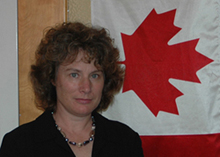Trekking for knowledge
History professor Bonnie Lynn-Sherow spent time in Canada this summer to supplement research
An associate professor of history at Kansas State University is leading the way to bring more Canada to K-State.
 K-State's Bonnie Lynn-Sherow spent three weeks of her summer traveling through Canada, meeting with various Canadian officials and scholars and learning more about the country to augment K-State's Canadian studies program and her courses in Canadian history, North American environmental history, North American Indian history and the history of agriculture.
K-State's Bonnie Lynn-Sherow spent three weeks of her summer traveling through Canada, meeting with various Canadian officials and scholars and learning more about the country to augment K-State's Canadian studies program and her courses in Canadian history, North American environmental history, North American Indian history and the history of agriculture.
Her 5,000-mile trek through Canada was sponsored by the Canadian government, the Canadian Consulate, the State University of New York at Plattsburg and the Association for Canadian Studies in the United States.
Lynn-Sherow was one of only 20 participants -- from an applicant pool of 700 -- selected for the Connect Seminar, July 22-27, in Ottawa, Canada. The seminar provided a weeklong immersion in Canadian history, economics, politics and culture. Seminar members also met with Canada's Fulbright director, the Canadian Office of Foreign Affairs and the American Consulate. They visited the Supreme Court of Canada and discussed Canadian affairs with leading scholars, who presented their latest research for the seminar.
In addition, Lynn-Sherow received a faculty enrichment grant from the Canadian Consulate in Washington, D.C., to travel to Canada's central and prairie provinces -- Ontario, Manitoba, Saskatchewan and Alberta -- where she met with colleagues in Canadian studies and visited museums and other cultural sites such as Lake Louise in Banff National Park.
She said her favorite task was interviewing average Canadians about Canada and videotaping and photographing the places that she and her husband, Jim Sherow, a professor of history at K-State, visited for use in her classes.
"The importance of Canada to the USA as a trading partner is hard to exaggerate," Lynn-Sherow said. "With an average daily exchange of $1.5 billion each day crossing the U.S.-Canadian border, the trade between our two countries is the largest between any two nations on the planet. And, as demand for basic commodities such as oil, gas, wood and water increase in the U.S., I think trade with Canada will increase proportionately.
"Due to the clause in the North American Free Trade Agreement, or NAFTA, that limits the exchange of cultural goods, books, films and other items, teaching materials from Canada are not readily available to scholars in the United States," she said. "That's why this trek through Canada this summer was so valuable."
Lynn-Sherow said it also is imperative for environmental/native studies historians to visit the places they teach about.
"I can explain how a buffalo jump works, but to visit Head-Smashed-In buffalo jump in Alberta, a site that was used for more than 5,000 years, allows me to really help my students visualize and experience the central importance of this site to North America," she said.
The benefits of Lynn-Sherow's Canadian travels will start immediately. Students in her agricultural history class this fall will learn about the Mennonite diaspora in the U.S., Canada and Central America.
She also will incorporate new Canadian materials into her upcoming classes in environmental and Indian history. In addition, a new class in Canadian studies is scheduled to be taught in fall 2008.
Lynn-Sherow is the author of "Red Earth: Race and Agriculture in Oklahoma Territory," released by the University Press of Kansas in 2004. She received her doctorate in 1998 from Northwestern University in Illinois. A K-State faculty member since 1998, she was promoted to associate professor in 2004.
Photo: Bonnie Lynn-Sherow says it is imperative for environmental/native studies historians to visit the places they teach about.